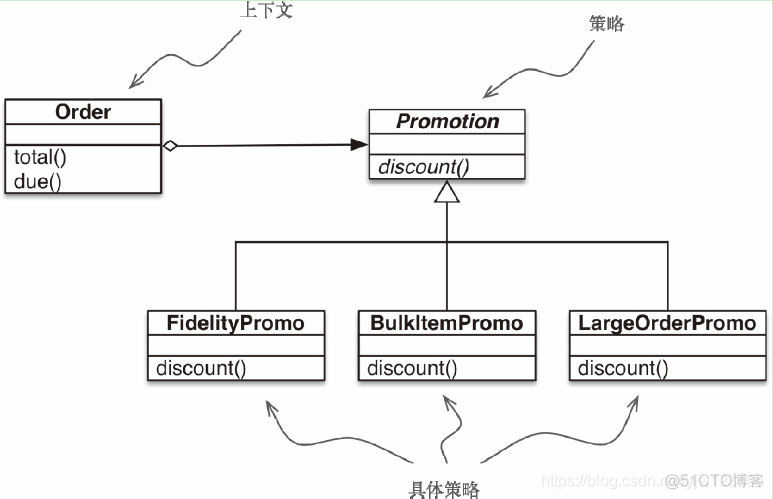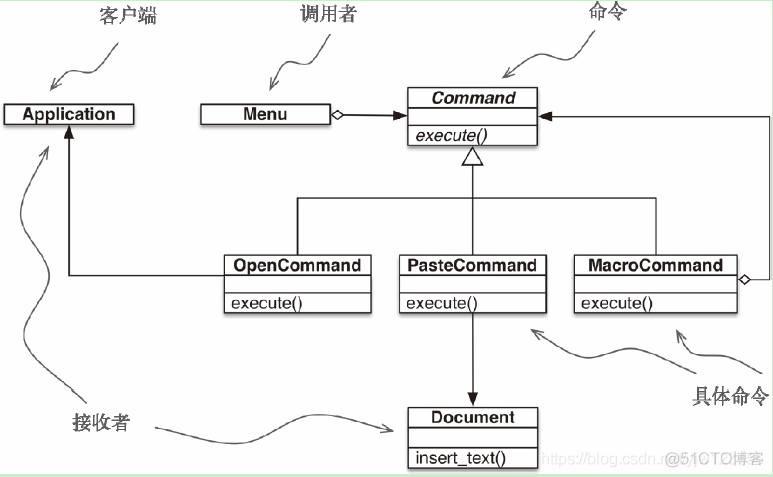本篇将使用函数对象重构策略模式,还将讨论一种更简单的方式,用于简化命令模式。
重构策略模式
首先看一下经典的策略模式是怎么实现的
经典的策略模式

from abc import ABC,abstractclassmethod
from collections import namedtuple
Customer = namedtuple('Customer','name fidelity')
class LineItem:
def __init__(self,product,quantity,price):
self._product = product
self._quantity = quantity
self._price = price
def total(self):
return self._price * self._quantity
class Order: #上下文,也就是客户端代码
def __init__(self,customer,cart,promotion = None):
self._customer = customer
self._cart = list(cart)
self._promotion = promotion
def total(self):
if not hasattr(self, '__total'):
self.__total = sum(item.total() for item in self._cart)
return self.__total
def due(self):
"""折扣"""
if self._promotion is None:
discount = 0
else:
discount = self._promotion.discount(self)
return self.total() - discount
def __repr__(self):
fmt = '<Order total: {:.2f} due: {:.2f}>'
return fmt.format(self.total(), self.due())
class Promotion(ABC): #声明抽象基类的方法,继承abc.ABC(abstract base class)
@abstractclassmethod
def discount(self,order):
"""返回折扣金额(正值)"""
class FidelityPromo(Promotion): #第一个具体策略
"""为积分为1000或以上的顾客提供5%折扣"""
def discount(self,order):
return order.total() * 0.05 if order._customer.fidelity >= 1000 else 0
class BulkItemPromo(Promotion): # 第二个具体策略
"""单个商品为20个或以上时提供10%折扣"""
def discount(self, order):
discount = 0
for item in order._cart:
if item._quantity >= 20:
discount += item.total() * .1
return discount
class LargeOrderPromo(Promotion): # 第三个具体策略
"""订单中的不同商品达到10个或以上时提供7%折扣"""
def discount(self, order):
distinct_items = {item._product for item in order._cart}
if len(distinct_items) >= 10:
return order.total() * 0.07
return 0
if __name__ == '__main__':
joe = Customer('John Doe', 0) # 积分0
ann = Customer('Ann Smith',1100) #积分1100
cart = [LineItem('banana', 4, .5),LineItem('apple', 10, 1.5),LineItem('watermellon', 5, 5.0)] #3个商品的购物车
print(Order(joe,cart,FidelityPromo())) #<Order total: 42.00 due: 42.00>
print(Order(ann,cart,FidelityPromo())) #<Order total: 42.00 due: 39.90>
banana_cart = [LineItem('banana', 30, .5),LineItem('apple', 10, 1.5)]#30个香蕉和5个苹果
print(Order(joe,banana_cart,BulkItemPromo())) #<Order total: 30.00 due: 28.50>
long_order = [LineItem(str(item_code), 1, 1.0) for item_code in range(10)] #有 10 个不同的商品,每个商品的价格为 1.00 美元。
print(Order(joe,long_order,LargeOrderPromo())) #<Order total: 10.00 due: 9.30>
print(Order(joe, cart, LargeOrderPromo())) #<Order total: 42.00 due: 42.00>
代码是可用的,但是我们可以使用更少的代码实现相同的功能。
使用函数实现策略模式
在上面的代码中,具体策略都是一个类,而且都只定义了一个方法,
即discount。此外,策略实例没有状态(没有实例属性)。你可能会
说,它们看起来像是普通的函数——的确如此。
下面对以上的代码进行重构,去掉了Promo抽象类:
# -*- coding: utf-8 -*from collections import namedtuple
Customer = namedtuple('Customer','name fidelity')
class LineItem:
def __init__(self,product,quantity,price):
self._product = product
self._quantity = quantity
self._price = price
def total(self):
return self._price * self._quantity
class Order: #上下文,也就是客户端代码
def __init__(self,customer,cart,promotion = None):
self._customer = customer
self._cart = list(cart)
self._promotion = promotion
def total(self):
if not hasattr(self, '__total'):
self.__total = sum(item.total() for item in self._cart)
return self.__total
def due(self):
"""折扣"""
if self._promotion is None:
discount = 0
else:
discount = self._promotion(self) #只需调用self.promotion()函数
return self.total() - discount
def __repr__(self):
fmt = '<Order total: {:.2f} due: {:.2f}>'
return fmt.format(self.total(), self.due())
# 每个策略都是函数
def fidelity_promo(order):
"""为积分为1000或以上的顾客提供5%折扣"""
return order.total() * 0.05 if order._customer.fidelity >= 1000 else 0
def bulk_item_promo(order):
"""单个商品为20个或以上时提供10%折扣"""
discount = 0
for item in order._cart:
if item._quantity >= 20:
discount += item.total() * .1
return discount
def large_order_promo(order):
"""订单中的不同商品达到10个或以上时提供7%折扣"""
distinct_items = {item._product for item in order._cart}
if len(distinct_items) >= 10:
return order.total() * 0.07
return 0
if __name__ == '__main__':
joe = Customer('John Doe', 0) # 积分0
ann = Customer('Ann Smith',1100) #积分1100
cart = [LineItem('banana', 4, .5),LineItem('apple', 10, 1.5),LineItem('watermellon', 5, 5.0)] #3个商品的购物车
print(Order(joe,cart,fidelity_promo)) #<Order total: 42.00 due: 42.00> 注意不要传'fidelity_promo()'
print(Order(ann,cart,fidelity_promo)) #<Order total: 42.00 due: 39.90>
banana_cart = [LineItem('banana', 30, .5),LineItem('apple', 10, 1.5)]#30个香蕉和5个苹果
print(Order(joe,banana_cart,bulk_item_promo)) #<Order total: 30.00 due: 28.50>
long_order = [LineItem(str(item_code), 1, 1.0) for item_code in range(10)] #有 10 个不同的商品,每个商品的价格为 1.00 美元。
print(Order(joe,long_order,large_order_promo)) #<Order total: 10.00 due: 9.30>
print(Order(joe, cart, large_order_promo)) #<Order total: 42.00 due: 42.00>
函数拿来即用,不需要实例化促销对象。
至此,我们使用函数实现了策略模式,由此也出现了其他可能性。假
设我们想创建一个“元策略”,让它为指定的订单选择最佳折扣。接下来
的会接着重构,利用函数和模块式对象,使用不同的方式实现这个需求。
选择最佳策略:简单的方式
我们继续添加3个测试,计算所有折扣,返回额度最大的:
promos = [fidelity_promo, bulk_item_promo, large_order_promo]def best_promo(order):
"""选择可用的最佳折扣"""
return max(promo(order) for promo in promos)
print(Order(joe, long_order, best_promo)) #<Order total: 10.00 due: 9.30>
print(Order(joe, banana_cart, best_promo)) #<Order total: 10.00 due: 9.30>
print(Order(ann, cart, best_promo)) #<Order total: 10.00 due: 9.30>
虽然这个函数可用,但若想添加新的促销策略,要定义相应的函数,还要记得把它添加到 promos 列表中;否则,当新促销函数显式地作为参数传给
Order 时,它是可用的,但是 best_promo 不会考虑它。
找出模块中的全部策略
如果是Java的话,一般通过反射来实现,且看Python是如何实现的。
在 Python 中,模块也是一等对象,而且标准库提供了几个处理模块的函
数。Python 文档是这样说明内置函数 globals 的。
globals() : 返回一个字典,表示当前的全局符号表。这个符号表始终针对当前
模块(对函数或方法来说,是指定义它们的模块,而不是调用它们的模块)。
if name.endswith('_promo') #以_promo结尾且不是best_promo方法
and name != 'best_promo']
收集所有可用促销的另一种方法是,在一个单独的模块中保存所有策略
函数,把 best_promo 排除在外。
promos = [func for name, func in
inspect.getmembers(promotions, inspect.isfunction)]
命令模式

我们可以不为调用者提供一个 Command 实例,而是给它一个函数。此
时,调用者不用调用 command.execute(),直接调用 command()
即可。MacroCommand 可以实现成定义了__call__方法的类。这
样,MacroCommand 的实例就是可调用对象,各自维护着一个函数列
表,供以后调用:
"""一个执行一组命令的命令"""
def __init__(self,commands):
self._commands = list(commands)
def __call__(self):
for command in self._commands:
command()
